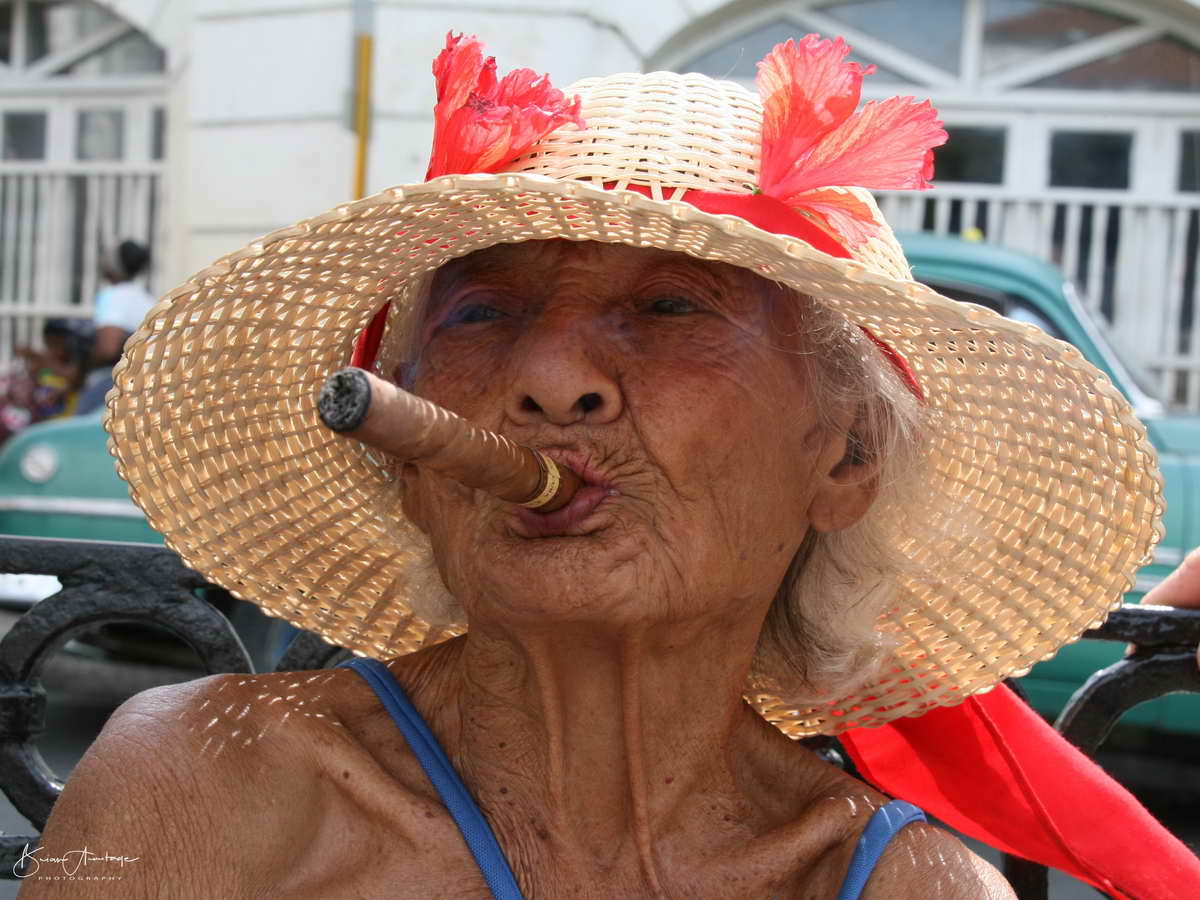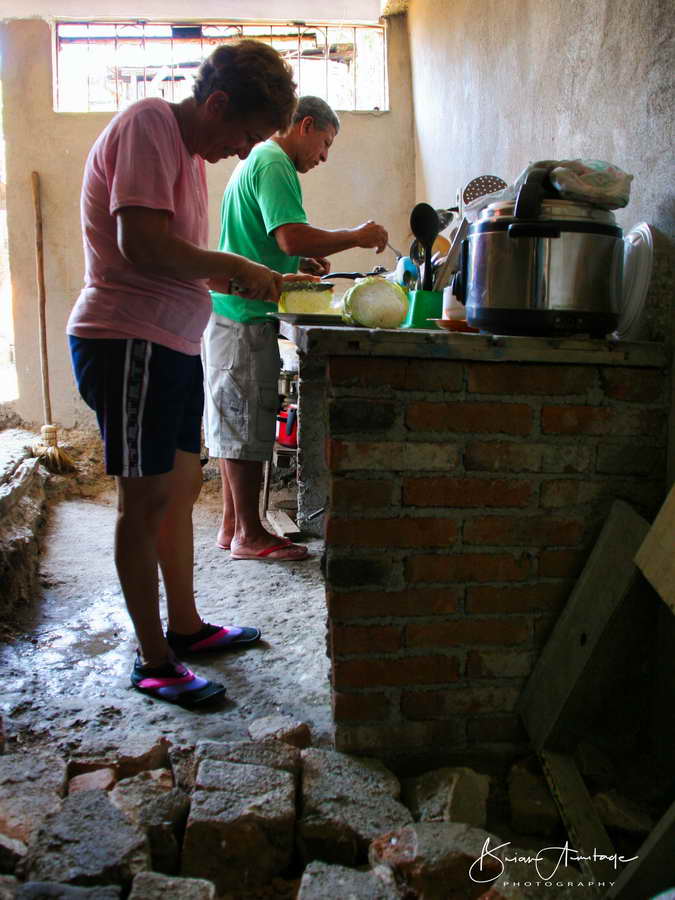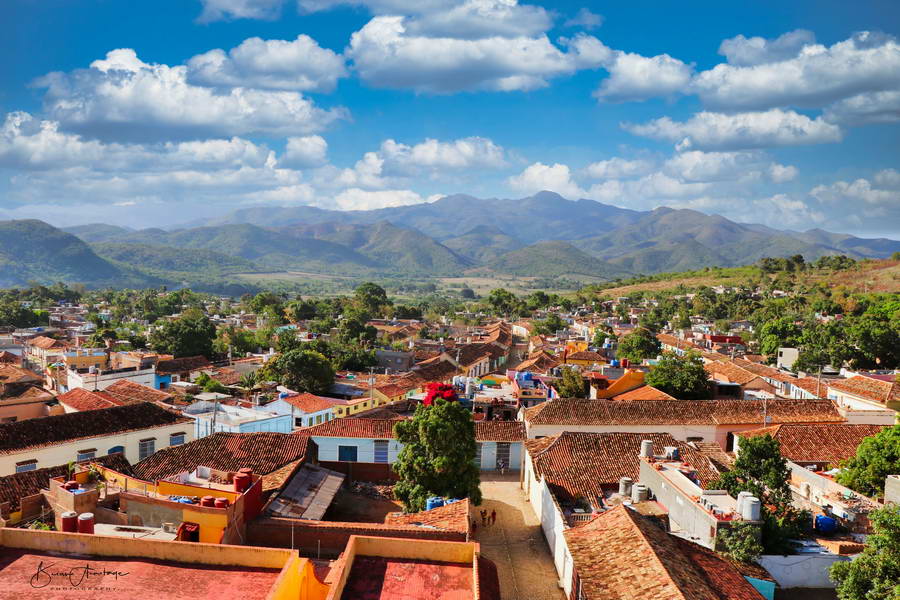For most North Americans, Cuba is a land of mystery. U.S. Citizens are only allowed to visit if their trip falls under one of 12 specific categories, with “tourism” notably absent from that list. Canadian Citizens are allowed to visit Cuba without restriction but typically tend to choose other more traditional island destinations for their holidays.
This trend is slowly changing and most travellers who do visit Cuba come for fun in the sun, rarely leaving the properties they have chosen to visit except on short, excursions organized by the resort. The rest of Cuba, away from the glitz and glamour of the tourist areas, is often not experienced. While the resorts do have their appeal, Brian Armitage has also travelled extensively throughout the island nation making friends and experiencing Cuban life along the way.
Brian’s love of Cuba actually began with a trip to Calgary, AB in the mid-1980s. “I was heading out to Calgary and Vancouver, by myself, to visit some old friends. My mom gave me this old Russian 35mm camera,” he recalls. “While I was in Calgary, I ran into an opportunity where I got backstage passes for Iron Maiden and the Scorpions. That was just a fluke.” All he was required to do was help bring in food from the caterer.
“We were there way ahead of time, and our car was parked near the back door of the arena, Brian continues. “Of course, I have my camera. The next thing I know, the road manager for Iron Maiden befriended me. The only thing I can think of is that they must have thought I was a photographer from Rolling Stone Magazine because I had a cool camera. Back then bands were screaming for publicity for marketing. If you had only seen the pictures you wouldn’t have thought I was pro!
Brian, His Camera, and Cuba
“I think they just assumed it was going to get published in some magazine or something. He asked if I wanted to come in and meet the band. Now I’m in the room with Iron Maiden and they’re eating the food that I’d carried in and the next thing I know, I’m eating the food that I’d carried in! When I told them where I was from, near Windsor, they offered me to get on the bus with them because they were heading to Detroit in the near future. I wish to this day that I would have taken that offer! “
Brian learned quickly that having a camera in his hands gave him access to people and places that others might not get. He said, “That’s what really sparked me and got me going in photography.” From there he found a passion for landscape photography and would take his camera on work-related trips that brought him across Canada and into contact with numerous people. “Being in the labour movement, I had an opportunity to meet a lot of very interesting people and get their photos. Dr. Henry Morgentaler, Caesar Chavez, a slew of others. I look back and at my photos and go ‘wow!’”
Fast forward to 2010, the year of his first trip to Cuba. It came about through mutual interests and connections he had made which put a fantastic opportunity in his lap. Brian recalls, “ I had met a music producer and promoter out of Toronto who remains a good friend to this day. They were working in Santiago, Cuba on this 46-piece Cuban cabaret show and they were getting to the point where they needed marketing material.
I was approached to see if I would volunteer my time and go to Santiago, do a photoshoot and also work with the video team on putting together this marketing material. I think on Youtube it’s called Fire of Cuba.
“It immersed me in Cuba, far away from the fun in the sun, not with resort life, but with everyday city people. They set me up with a Cuban who could speak English pretty good and hired a driver. One of the highlights was visiting some of the families of this Cuban cabaret that invited me to their house. I came out of the week with, probably, thirty friends. Ten of them, to this day, are very close friends.”
Carlos and Maria Prepare a Feast
Brian, and his camera, have made somewhere between 25 to 30 trips since that first one, and he rarely spends time in the tourist areas, although he has learned to enjoy them as well. He said, “I like to travel the backroads. Starting out from Santiago, which is almost the eastern end, to the very eastern tip of Cuba called Baracoa, central Cuba and as far west as Trinidad. I’ve never desired to travel to Havana, although that day will come. I’ve just never made it to that part yet. I’ve bounced all over 2/3s of the island.
“Travelling the back roads, I’ve travelled by train, horse, oxen. I tried a little bit of hitchhiking. Most of the time I have a driver. Having a driver is smart in Cuba. In Santiago, my good friend Eloy will pick me up and I’ll give him a list of things I want to do. Then he will put my itinerary together for what we can and what we can’t do.”
Brian noted that Cuba is still a communist country, and is highly regimented. This can feel very odd to someone accustomed to more personal freedom. “In Cuba, if you are a taxi or a driver you gotta have a license. If you have a tourist in your car, a ‘gringo’ in your car, and you don’t have that license you can go to jail. It’s as simple as that. I find their laws are very black and white, not a lot of wiggle room for lawyers to get you out of it.
“So one time, we’re way out in the country and to get where we were going we had to go through this crossroads intersection. They’re just friends, and they don’t have a license. I just assumed they had the right to have a tourist in their car. Next thing I know, they pull over in a panic and insist that they hide me because there’s a police checkpoint at this crossroads in the middle of nowhere. I was kind of being smuggled through this area.”
Because of the friendships he has developed, Brian often finds himself at least starting out in a familiar location. “Santiago, for the longest time, was basically my headquarters,” he said. “It has led to some very interesting photoshoots. It took me about three or four trips into Santiago, and I have no proof of this, but it seemed like doors started opening up. It was like I wasn’t seen as a tourist anymore.
“Santiago is known to be on the wilder end of Cuba. It’s where the old politicians, artists, and musicians seem to retire. It is also where the revolution started. Around Cuba, you find a lot of military checkpoints, but they are far more restrictive in Santiago than they are in Havana. If there is a protest it comes out of Santiago. If there is a movement taking place, it comes out of Santiago. So they really keep a close eye on it. Back in the days of the revolution, they had what were called ‘Block Mothers’ and they reported any suspicious activity. Even though today they probably no longer exist, you can still feel the tensions of the locals who continue to feel watched.”
Trinidad from a Church Steeple
The possibility of being watched was actually a little exciting to Brian. On the first trip, he stayed at Chino’s casa, who would eventually become a good friend. “Chino must have got a heads up that I was involved in politics and the labour movement. He strongly advised me that on this first trip there, I wasn’t really allowed to wander around without someone with me. I was told ‘no talking politics, no talking union.’
“So, in my defiant way, instead of waiting on others, I decided one day I was just gonna go grab a bottle of rum and go visit some neighbours. I was only gone for 15 minutes about three or four doors down. All of a sudden out in the street I hear these voices with their cuban accent. “Blian! Blian!” They were not too pleased he had gone out on his own.
Being close to the locals also led to some interesting situations. Brian laughs as he remembers, “There was one night, these two friends I was with wanted to take me to the main square Parque Cespedes. There is this lady famous in many magazines called the ‘Cigar Lady.’ My friends wanted to see if they could find her for me. So we were there at night just sitting around on these park benches and we were having a few beers. You can drink beer anywhere there.
“So then, this kind of a rough-looking lady comes and she sits beside me. She says, ‘Senor, Canada?’”
“Si,” he replied.
“‘Ah I like Canada!’” she said. Apparently, she is trying to tell me that she is a Salsa teacher and she goes to Montreal a couple of weeks out of every year to teach Salsa. But this lady has
that truck driver look with sketchy tattoos. Now you have to understand, at that time tattoos
were not popular in Cuba and were predominately worn by those who did time in prison. I doubt she was a Salsa teacher.
“Want to go to a fiesta?” she asked.
“‘No, No, I’m here with my friends,’ Brian replied. “The fact that she could speak English–that part, I was really enjoying. So then she asked me if I would buy her a bottle of rum. So, Sure! That’s like two or three pesos. She’s on the park bench with her bottle of white rum and we’re just talking. She keeps trying to get me to a fiesta, and what do I say? Dumb me, it’s like 9:30 at night and I tell her ‘I have a meeting!’
“She is slowly trying to get me to go to this fiesta. She looks at me and she goes, ‘you married?’
“Siiiiii,” said Brian slowly. “I pointed to the ring on my finger. All of a sudden her shoulders go up and the look on her face. ‘She here?!?!’
“‘No Canada.”
She relaxes and with a big smile, ‘Want to go fiesta?’
“Salsa teachers” aside, Brian has also experienced other aspects of Cuban life. Another trip and a different friend allowed him to understand how people circumvent the official stores to get what they need.
He begins the story, “Their house had been ravaged by several hurricanes, so I wanted to invest in their house and make things better for them. The pictures of their children as babies are all water-damaged. Half the building was ripped apart from hurricanes on the upper floor.
“We’re going to do work on the house and get some fresh paint. They ended up getting fined for painting in the house without a permit. You gotta remember that all this stuff is controlled by state stores. You go to whatever place to get paint-they gotta show their ID card. It goes through their head area and they go, ‘Oh, that house doesn’t have a license to do this.’ That’s the kind of control they have.
“Anyway, we’re working on the bathroom now. Eloy [another friend], takes me to this place where we can get a toilet tank. We can’t find a matching tank, so we go to another store and then a third store.
Shopping the Local Produce Truck
“I noticed this great big guy following us. I see him, I keep seeing him off in the distance watching us. This guy is football material. Next thing I know, him and Eloy are talking. Eloy comes over to me and he goes, ‘Brian. This guy.. he got what you want Sshhh! Black Market!’
“We get in Eloy’s car, drive a block away, and then this guy gets in. It was like a secret mission! We go to one end of Santiago, he runs in and makes a phone call. Then he comes back out and we go to the other side of Santiago where apparently I can go in and look at the goods they have.
“We park out front, and this big guy gets out and goes in. Next thing you know there’s a motorcycle cop behind us. Eloy, he’s going, ‘Oooh! Polizia Polizia! Shh! Don’t say nothing!’ I’m sitting there going, ‘big guy, don’t come out of the house right now!’ So the cop is talking to Eloy, I’m sitting there shitting bricks, and what happens? Big Guy comes out of the house.
He walks right over to the car, to my side. Eloy looks over at me and says, ‘Brian, go, go!’ So I go up to the second or third story and here is this old lady who runs this black market thing. I pick out the toilet we want, and they are going to deliver it for us, very cheap. I get back out to the car, the cop is gone. ‘Eloy, everything ok?’ ‘Si!.. I was parked in the wrong spot!’”
Spending time with Eloy also allowed Brian to become an unknowing beef smuggler. On his way home from one trip, Brian found his flight significantly delayed. Eloy insisted that Brian spend the day with him until it was time to go back to the airport. “So, he takes us to this farm. It’s rare they get visitors. It’s up the coconut tree, take a coconut down and give you a drink of fresh coconut along with a tray of farmer’s cheese and guava. That’s Cuban hospitality. You’re totally welcome.
“What I didn’t know, the reason for Eloy going to this farm is he was getting a beef roast, which is illegal for Cubans–they can’t be in possession of beef. I was always told that cattle was sacred, but I didn’t buy that story. I didn’t see any pendants with cows on them!
“Anyway, Eloy has got this big roast stashed away in his trunk. He had his wife with him at the time and they were going to spend the day at the beach. So I told them ‘you go do your thing, I’ll be around.’ Well, when it comes time to come back, we get caught up in a military checkpoint. “
“Brian!” hissed Eloy.
“What?”
“ I got the beef! I got the beef!”
“They checked in the back, they were curious about me and be darned, they didn’t see the beef!”
A View of Santiago
There were many more adventures. Brian has been invited into houses, businesses and celebrations. He was even allowed to attend a Santeria ceremony, which cost him a pigeon and a chicken. He has seen towns and mountains which sheltered the communist revolutionaries and travelled roads rarely seen by foreign eyes.
“That is the neat thing,” says Brian. “ I can be out on my own and feel safe. The driver will drop me off and I will say ‘I’m going this way.’ When he returns to the drop
points he asks another Cuban, ‘Which way did the gringo go?’ They just point and he finds me in no time at all.
“That’s what I want. I want to eat their food, I want to travel like them. I insist on it. I want the full experience.” This is the Cuba that Brian loves. It’s the Cuba that keeps bringing him back.
All Photographs Courtesy of Brian Armitage
Brian is available for presentations about Cuba. You can email him here.
Brian also maintains a Flipboard that contains news and all things Cuba. You can find that here.










Very Interesting – Thanks for sharing!
Was looking at going on at trip there prior to COVID… It might get re-scheduled in 2022.
Tommy DaComic
Thank you for sharing your Love for Cuba Brian! Great read for those who have never had the experience and I hope your article prompts one to visit this amazing little island . We have been travelling to Santiago for 14 years now except during Covid 🙁 It’s the people! I have never met a human with so much love in their hearts, and it’s genuine. When I am able to retire I will be spending more time there for sure.